Issue Number 51, Winter 2020-21
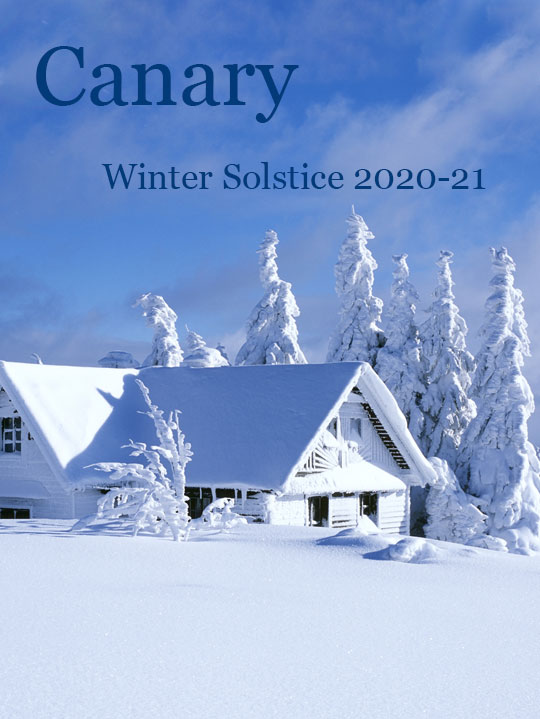
Contents
- Gift for My Newly Widowed Friend by Barbara Quick
- Resurrection by Barbara Quick
- To the swans, nine days before Christmas by Aurora Shimshak
- Snowfall by Aurora Shimshak
- the word for world by Jordan Osborne
- Birch I by Marybeth Holleman
- Yellow by Dion O'Reilly
- Spilling robins across the sky by Gene Hyde
- Winter and the Tit Mouse by Thomas Mitchell
- Compass Points by Robert Coats
- The Flood by Federica Santini
- L.A.S.T.O.N.E by Kayann Short
- Coyote Prayer by George Perreault
- Everything Shifts Here by Mary Bergman
- To Infinity and Beyond* by Jennie Meyer
- The Fossil Record by Brian Simoneau
- Wisdom by John Kaprielian
- Peregrine Falcon:
Manhattan by Daniel MacIsaac - Axis Mundi, Tree at the Center of the Universe by Muriel Nelson
- Arctic North by Therese Halscheid
- The Telling Wind by Therese Halscheid
- Land of No Time by Therese Halscheid
- All That Glitters Is Not by Ellaraine Lockie
- Check-out by Brendan Galvin
- One Unseasonable by Jonathan B. Aibel
- All Good Frogs Should be Asleep by Jonathan B. Aibel
- Dormant Season Controlled Burn, Calloway Forest by Maura High
- Moorings by D.R. Goodman
- Habitat and the Most Magnificent Mammals by Marshall A. Lichtman
- Mending Mittens by Larry Schug
- At the Window After a Great Snowfall Waiting for You to Come Home by Laura Budofsky Wisniewski
- Winter Dusk by Jonathan Blake
- Ragged Angels by Jonathan Blake
- Mount Liberty in March by Sahra Kuper
Archives: by Issue | by Author Name

Gift for My Newly Widowed Friend
(for Grace Cavalieri)
by Barbara Quick
Barbara spends a lot of time tending the edible gardens she's planted in the sandy loam of a small farm and vineyard on the Santa Rosa Plain, nestled between the Pacific Ocean and the Mayacamas Mountains.

If we learn now
to speak the language of angels,
death won’t stop our conversation.
I can’t speak to you of loss in this language
without feeling weighed down
by the clay of my body.
Will I learn before I die?
This jar of jam is filled
with all the sweetness to be coaxed
from black earth and a thicket of raspberry canes.
Marriage, in other words.
I’ve made it not too sweet,
so you can taste the foggy mornings
and the nights when you couldn’t sleep.
I’ve sent it too late
for you to taste it with him.
It’s winter now, and it seems these dry sticks
can’t possibly grow green and leafy,
heavy with fruit.
This is what faith is:
Knowing that the garden
will feed us again.
© Barbara Quick

Resurrection
by Barbara Quick
Barbara spends a lot of time tending the edible gardens she's planted in the sandy loam of a small farm and vineyard on the Santa Rosa Plain, nestled between the Pacific Ocean and the Mayacamas Mountains.

On the last day of the year
I plant tulips.
A magpie with a trowel,
I bury my treasure of hope.
In Holland, during World War II,
desperate Dutch children ate them—
years of starvation and scarcity,
when barrel staves were made to do
for bicycle tires.
In 1637,
a semper Augustus tulip bulb
was worth ten times the yearly earnings
of a barrel maker or twelve acres of land.
I’m not thinking of wealth or food
as I dig each little grave
and place each peeling, corpse-white bulb inside.
As darkness falls,
I tamp the soil down with one gloved hand,
my thoughts on resurrection.
© Barbara Quick
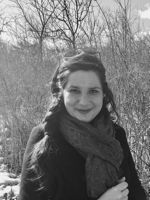
To the swans, nine days before Christmas
by Aurora Shimshak
Aurora grew up in the Kickapoo River Valley and now lives in the Yahara watershed on the lacustrine plain of Lake Wingra.

Slow on the rock path to the garage
with Grandma, my mind deep in its cavern,
saying, Careful. Saying, Cold is just a sensation,
feel it in your nostrils, name it, cold, cold—
which is when we hear the honking,
look up to the cloudless
sound before crest of hill, their V
spanning arc of tree line, sun
slanting their feathers absent, wings
slipped into sky slits, reappearing
throat call: two breaths to the river,
two more to gone. Grandma says,
We’ll have to tell Grandpa, and I ask
Do you think they were swans?
Could be. Swans unzipping wind,
wood smoke, ice light.
© Aurora Shimshak

Snowfall
by Aurora Shimshak
Aurora grew up in the Kickapoo River Valley and now lives in the Yahara watershed on the lacustrine plain of Lake Wingra.

always looks like it’s coming
from the just out of reach sky
air’s magic trick
pulling from invisible seams
this softness
the slow of it
the way it insists
on soundlessness
checking on the high school choir
learning
in the old part of the building
the words to Handel’s Messiah
& the soothe of it
around
the steel barrel of the
garbage fire
its field-edge box
of matches
almost makes up for the dark
maybe makes up for
looking out the window in English
& the only thing that registers is still
it’s March
and it’s no use
pleading because it’s just going to last
feet numb
hands
squeezed between
your jeans
only warm in the
bathtub or right in front of the heater
but okay
but at least
but first one of the year
you can’t help but open
your mouth.
© Aurora Shimshak

the word for world
by Jordan Osborne
Jordan Osborne lives nestled between the Front Range prairie and Long's Peak in Colorado.

in our carelessness we often are either
a dead doe on the edge of the highway
ribcage opened like a cut palm in offering
or a soggy cardboard box crumpled &
often i suspect we are both considering
how we complain of the snow despite
praying as we sleep for it to cover
the world convert the world into another
sort of water & the word for world
is something like water something like
taking in coveting water & reaching
the world is a word for water frozen water
breaking off & into stilled saltwater
like eyes that no longer look back we do not
know which is the cardboard box &
which the crumpled doe we do not know
a dead thing from a deadened thing or
where the snow comes from we
do not know the water
© Jordan Osborne
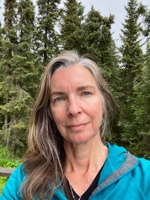
Birch I
by Marybeth Holleman
Born near the Cuyahoga River just before it caught fire, raised in the Great Smokies near the rolling waters of the Upper French Broad, Marybeth transplanted to Alaska’s Chugach Mountains after falling head over heels for Prince William Sound—just two years before the devastating Exxon Valdez oil spill changed her life trajectory.

Branches reach and then break
in winds and snows,
then rebuild and rebreak,
again and again:
transforming suffering to beauty,
one leaf at a time.
© Marybeth Holleman
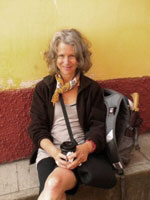
Yellow
by Dion O'Reilly
Dion lives in the Soquel Creek watershed on a stream-cut terrace covered with a thin mantle of alluvium on a ten-acre triangular plot between Soquel Creek and its tributary, Love Creek.

It’s February, and the acacia
is blooming. Not wet,
though winter’s well along,
and the flowers by now
should be cold and sodden.
No matter. The air is helpless,
punch-drunk with pollen.
I know what’s next—
rooty mustard. Fields of it
mixed with the weightless
mouths of sour grass
showing their throats
as they shift on listless stems.
Yellow’s the first color of spring.
Hope yellow. Sick yellow.
Kitchen yellow. Pollen-petaled heart
of the columbine yellow, she-lost-
her-mind-and-ran-away-with-the-
pearl-handled-kitchen-knives yellow.
Head home to California
on the Gray Rabbit bus line,
from Seattle to San Francisco,
seats stripped-out, hippies
on dirty mattresses,
spooning and massaging
above the hum of the drivetrain.
Stop at Crescent City, stand
on a ridge, above a full-bloom meadow.
All that yellow
feeding my brain after nothing
but pine and pewter-grey.
I’m home. Thirty years now,
the rain behind me,
but I’m calling for it
down from the north
to scrub the thick air,
dampen the dried loam.
I’m too old to climb
the silver-skinned acacias,
botched with notches of crumbly black,
to sit thirty-feet-up
and scratch the bark’s thin skin,
smell the whiskey-wood stink,
see the hard green beneath,
smooth as muscle on an athlete’s arms.
To bower myself, safe
between limb and trunk
like I did when I was six
thinking nothing could touch me.
Not strange weather,
not whatever way the world ends.
Originally appeared in the author’s collection Ghost Dogs
© Dion O'Reilly
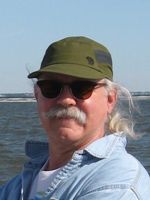
Spilling robins across the sky
The shape of the wind is a tree bending, spilling its birds.
- Wendell Berry, “Elegy”
by Gene Hyde
Gene lives in Upper French Broad River watershed in the Blue Ridge Mountains of North Carolina.

photo by Gene Hyde
Unseen, the wind is
Bending branches, spilling birds:
You can almost feel
The shape of the air.
Wings lifting in the buoyant breeze
Soaring above, then
Alighting again
Awaiting the wind, bright breasts
In the deep blue sky.
© Gene Hyde

Winter and the Tit Mouse
by Thomas Mitchell
Thomas lives on the Southern Oregon coast at the juncture of the Coos River basin and the Pacific, spending a great deal of time hiking the mountain trails and strolling along the beaches.

No symphony today. Only undiscovered wrens
hidden in the snowy brambles, the only sound…
the tic tic of a fly away branch tapping
against a jack pine. Is this how the ancients
measured time, listening to the pulse of Nature
in all her various forms? Maybe the movement
of clouds is more calculating than we ever suspected,
the graceful swaying of aspens more accurate
than the swing of a clock’s pendulum.
I’ve made this path by myself plodding crookedly
through a field of whiteness, veering east and west,
instructed by the random occasions of heart,
a palpitating stream, a tit mouse scrambling
over an icy floe. And even in the cold, dawn peeks
over the mountains.
© Thomas Mitchell
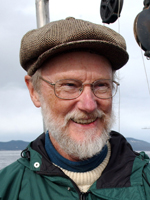
Compass Points
by Robert Coats
Bob lives in the watershed of Blackberry Creek, a small urbanized but partially-restored tributary of San Francisco Bay. He may also be found occasionally in the Tahoe basin, where he is studying the impacts of climate change.

North was toward
the creek of mossy rocks
leafy forest of sycamore,
shaggy hickory and tulip poplar.
South, the Potomac,
its algal fishy smell,
sandy banks, wheeling gulls
and fat gasping catfish.
East, the glow of dawn,
fields of blue phlox
wet with dew, the liquid
warble of a wood thrush.
West, the fiery sunset I watched
from the forbidden roof with neighbor kids,
pretending the bright cloud slivers
were flying saucers.
On a clear night of new-fallen snow
I found the Big Dipper,
the two stars that point to Polaris,
and found my place in the world.
© Robert Coats

The Flood
by Federica Santini
Federica lives close to the tangled wisteria of the U.S. South. When the days get long, you can find her walking on the woodsy trails of the Tuscan archipelago and looking down at the tiny Island of the Mice from the cliffs.

The rain falls in thin filaments,
its pat-pat no less threatening
than long hands out to get you.
In the receiver the voices
mimic its even rhythm
no longer expecting an answer.
The water pools under the curb,
in the void underbelly of trucks
their drivers long gone,
it amasses in empty lots,
rolls down dirty from the ravine.
With folded fingers it pulls
on the yellow heads of the broom,
unable to break down
the supple mass of the stalks.
The Ocean sags under its weight,
its dull stomach heavy with
the knotted lump of dark wedding cake.
Down from the California Incline,
the ground plunges breathless with rain.
The great body of the city collapses
one mini-mall at a time.
A last traffic island is alive
with the gleaming eyes of the rats.
© Federica Santini
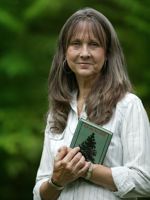
L.A.S.T.O.N.E
by Kayann Short
Kayann writes and farms near the mouth of St. Vrain Canyon on the eastern slope of the Colorado Rockies.

I. Once upon a time, dodos went missing. First encountered by Dutch soldiers on the volcanic island of Mauritius, the flightless bird’s last reputable sighting occurred in 1662, with “last” a realization made only in hindsight, for no one realized dodos were missing until researchers went looking for them in the 1800s. By then, no dodos could be found on Mauritius and, adding insult to injury, dead dodos sent back to Europe for study were missing, too—not that stuffing dodos saves them from extinction. For a long time, dodo disappearance was not accepted as scientific fact, for how could any animal of God’s creation be forever lost? An odd bird, mythic to some, an imaginary creature of Alice in Wonderland fame, its extinction seemed as chimerical as its existence.
But where did dodos go? First theories proposed they had been killed en masse by sailors for sport or food, but evidence for this was scant. More recent theories suggest vermin introduced from Dutch ships exterminated dodo eggs from nests and competed for dodo food, an early lesson, should anyone choose to learn it, in the dangers of ecosystem disruption.
Other human-induced extinctions followed: the last passenger pigeon died in 1914. She even had a name—Martha.
When Europeans first came to North America, passenger pigeon flocks were so large they blocked out the sun.
In the mid-1800s, mass hunting of the birds began.
In less than a hundred years, they were gone.
II. Sudan died March 19, 2018, at the 90,000 acre Ol Pejeta conservancy in Kenya. By then, Sudan had become an animal celebrity, #lastmalestanding, the last male northern white rhinoceros. His caretaker, Zach Metai, who considered himself half human, half rhino from his many years caring for Sudan, cried at his friend’s death. As the last male of a species, this singular animal received 40,000 visitors a year, becoming more famous as “the last” of his kind than he ever would have been if his species had flourished. Extinction offers a grim Kodak moment, a perversion of celebration, as we memorialize the ones we’ve lost on t-shirts, mugs, and phone cases.
III. In medieval times in Europe, villagers gathered to harvest the grains that would feed themselves and their livestock through the long winters. With sickles and scythes, they began at the field’s perimeter, slashing and hacking their way toward the middle. As the crops were felled, bolting rabbits and other small game were killed outright or chased back into the center for the bloody reaping to come. By decreasing the inhabitable space, a gathering place for small creatures seeking shelter and food became an arena of death, for there was no way to escape the slaughter of this mowing game, harvesting two crops at once until nothing was left.
IV. Recently, the United Nations reported that one million species of plants and animals are at risk for extinction due to human-induced climate change.
V. Many scientists suggest the planet is currently experiencing a sixth major extinction. In previous extinctions, as much as 96 percent of species was lost. More than 99 percent of all species to have ever lived on earth are now extinct. Prior extinctions were caused by natural disasters: volcanoes, asteroids, glaciation, and sea level falls. The sixth, however, is caused by us.
Ecologically speaking, the human species is toast.
VI. Within our lifetimes, we will lose more kinds of beings than we even knew existed.
One year ago, more species were lost.
One month ago, still others.
One week ago, the future became more precarious.
One day ago, ditto.
One minute ago, even more so.
One second to go, and it’s nearly over.
VII. Sometimes I imagine all the animals in the world thrown together in a gigantic bowl as a kind of animal salad, with two each of the creatures beloved by schoolchildren—giraffe, elephant, lion, gorilla—and the millions more we don’t commemorate on t-shirts. Lifted on the sea of ecological crisis by our collective good will toward all the world’s creatures, this bowl-shaped sanctuary ensures animal survival. It worked before, didn’t it?
VIII. Schoolchildren in Nepal celebrate Vulture Awareness Day on the first Saturday in September with song and dance, poetry competitions, rallies, and vulture counts. Efforts to protect the ecologically vital vulture population, including the banning of diclofenac, a deadly chemical used for livestock, are reversing the loss of this ecologically vital bird.
In Wales, youth conservationists work with farmers in the Penpoint Project to transform agricultural practices toward wildlife habitat restoration, a small project as a blueprint for other local campaigns.
And Greta, dear righteous, powerful Greta, who shames the politicians for their inaction, inspires us all.
IX. Together, we are writing the Last Animal Story to Oppose Nature Extinction. When you can’t go back, go forward. Big actions start small. Start local. Start now.
X. Because the last thing we need is another dead animal t-shirt.
© Kayann Short
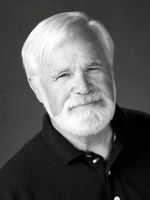
Coyote Prayer
by George Perreault
George lives 500' above the Truckee River, which runs from Lake Tahoe to Pyramid Lake; there is no outlet to this river system which supports four species of fish, one of which lives nowhere else. As is typical on this planet, the indigenous people who live at the terminus of the river are often at the mercy of those who live upstream.

After the night wind rearranges the patio,
snow spray-painting the tattered yard, hear
from an old friend in Florida, how she and
Coyote surprised each other outside the condo
how he sidled swiftly back toward the bay, this
south and west on the far side of the peninsula
from another school shooting, another massacre,
crowds of ravaged parents, stacks of body bags
where another crazy white man is to blame, so say
the white men as they pass out bullets and guns.
My old friend used to watch the Hueys stream
back from the front and the front was everywhere
like a dream from the latest war, the one where
natives ignite themselves inside the compound
the latest pain-crazed ally in our midst retold as
children slaughtering our own children, stories
spun round the fire, how Coyote brought forth
the world and its soil, all the Animal Peoples,
Two-Legs heedless and vicious above all, Coyote
watching from beyond, and when she’d looked into
his yellow eyes and could breathe again prayed
Creator, Creator Coyote, make us better than this.
© George Perreault
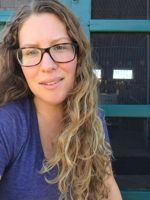
Everything Shifts Here
by Mary Bergman
Mary Bergman lives and writes 30 miles out to sea, on a crescent of sand in the Atlantic Ocean

A strange new obsession: wanting my body to feel, to look the same way it did three years ago. Three years ago I could look at this island without constantly considering its future. Two years ago, my face was already starting to line. Now the crease between my eyebrows is deeper. I worry about the island and my face in equal measure. My fingers trace the outline of my jaw, testing the tensile strength of my skin. There is no resisting any of it: the ocean, the wind, and time. We are all disappearing, all the time. Some faster than others.
Nothing else here remains the same. In fact, the thing that consumes my thoughts more than almost any other--the shoreline--the shoreline is constantly changing, shifting. It is allowed to change, expected to change. Trees lose their leaves and beach grass fades from kelly green to ochre to bleach-blonde. The seasons progress and we relish the small indicators of their shifts: the smell of woodsmoke in fall, the brilliant stillness of winter, the sound of randy peeper frogs in spring, and the thick air of summertime. Without winter, we wouldn’t have the migratory birds who stop and rest on our sandy shoals.
All this change grabs us upside down by the ankles and shakes us awake. It reminds us that we aren’t the ones in control. Somehow, this globe is still spinning, still orbiting the sun, still hurtling through space all these lightyears later. We are simply along for the ride.
Can you imagine a life where nothing shifted? There would be nothing to look forward to, nothing to endure, nothing to mourn. We’d plod on, no rise or dip in the road in sight. The neat division of the passing of the seasons throughout the year breaks up our lives into manageable chunks. They say you should write a short story in one sitting, a book in a season. (A love letter is best written in the evening, with the window open, the rumble of cars on the street mimicking the roar of the waves.)
My body is another animal. I see no beauty in my body’s changing seasons. I feel an overwhelming pull towards eroding cliffs and the houses that teeter atop them, I daydream about parabolic dunes shaped and re-shaped by the wind. My own topography is better left unmapped. The shoreline of my stomach would have to be redrawn each year. (I imagine Lilliputian surveyors and their sextants scrambling over my belly.) It ebbs in summer, the result of long days spent outside. Silver stretchmarks ripple across my breasts and thighs in a pattern echoing the tidal flats. Varicose veins and their tributaries crisscross my left leg, a choked river of blood. The thin skin of my eyelids the same translucent color as a laughing gull’s wing.
Already my body has started to age, in real, measurable ways. It is a presumptuous thing, to be worried about aging in the time of this great climate crisis. I should be so lucky to get old and dry and wrinkled as a riverbed. I see women with deeply lined faces; they carry with them decades of summers by the shore. They will be long gone before the waters rise, and they seem smug in this knowing. They eat bay scallops caught during a phytoplankton algae bloom that we are warned may cause short-term memory problems. They tell me their memories are already shot. There is still so much I need to remember.
And in an unfair set of circumstances, I never feel as beautiful as I do when I am at the shoreline. How could we not be beautiful, bathed in that pure white light, reflected by the sand and sea? Even during the shortest days of the year, I can rely on the wide expanse of beach to hold tight to the last lingering rays of sun. We will never be as beautiful as the ocean. Hers is a beauty that causes a slight physical pain, a catch in my throat, as if something inside me is slowly breaking. As if I can feel each grain of sand as it slips away, out from under me.
(A note: title of this piece is an homage to the first line of Robert A. Brooks’ 1968 poem Angle of Repose. Original line is “Everything shifts here, we agreed.”)
© Mary Bergman
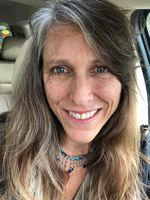
To Infinity and Beyond*
by Jennie Meyer
Jennie lives on Walker Creek, an estuary of tidal marsh and freshwater stream, and part of the Great Salt Marsh. Marshes are critical for absorbing storm surge and providing habitat for birds, fish and a myriad of wildlife. Jennie walks, kayaks, and skis on and through the marsh with her dog, picking up trash which the long grasses filter out of the sea.

Halfway along the beach I turn back,
my arms weighted down
with aquamarine fishing line, lures,
and cotton twine with nylon sinew
fraying out of cuts, like cyborg.
The ocean can’t afford the centuries
it takes for the glut of plastic to decompose.
Yet sea has been our limitless bounty,
bottomless,
receiving all our waste:
“What is that barge doing daddy?”
I asked as we sailed past the outer islands,
“It’s bringing the city’s trash to dump
in the middle of the sea.”
“Like the cruise ships we’ve seen?”
“Yes, but from a whole city.”
Now my son asks, perhaps in jest,
“Why can’t we blast our trash
into outer space—
It’s empty and infinite?”
“That’s just what we once thought
of the sea.”— A body
of boundless compassion,
now an ailing parent.
This, our evolution:
We loft our language of hope
from ocean to universe—
It’s wide open and still free.
*Buzz Light Year, from Toy Story
© Jennie Meyer
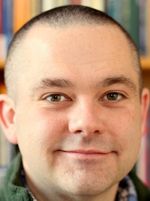
The Fossil Record
by Brian Simoneau
Brian Simoneau and his family live just outside Boston between the Blue Hills and the Neponset River.

Until now I was never one of those kids
obsessed with dinosaurs. Scientists say
we find, with luck, maybe forty percent
of a specimen's bones and reconstruct
the rest. A century of digging, entire
careers of imagining limbs and skin,
diet and teeth, has recreated bone
by resurrected bone an unknown species,
a fearsome aquatic hunter bigger
than T. rex. I say let us all be one
of those kids in paleo-print jammies
who memorize a million made-up names.
Take Saturdays to gaze at skeletons
strung together. Study forest floors for tracks
preserved by ancient mud turned stone.
Every bird on its perch discloses ways
the dinosaurs never left at all, bits
of life even extinction couldn't kill.
The news offers daily apocalypse,
daily strife. So nightly watch the sky
and remember how much rubble there is
to fall from space, its height never fated
to hold. Missiles swivel to face our homes
and glaciers loose a new flood's weight. Against
such days, may we all become dinosaurs.
Let us love the stories our bones will tell.
Previously published in Meridian.
© Brian Simoneau
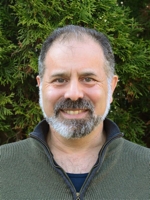
Wisdom
by John Kaprielian
John lives in the Croton watershed, equidistant from the Hudson River and the Great Swamp, at a lively spot on the Atlantic flyway.

They say Wisdom comes with age
and experience
and she does
finding her spot on the crowded
beach at Midway Atoll
as she has for six decades
searching the sky for
Akeakamai
her mate of at least a
dozen years
She is matriarch
unflappable
mother to dozens
guardian of the seas
soaring magnificently
over the open Pacific
traveling thousands of miles
in a single flight
Another year
another egg
hopefully another chick
she is a survivor
a witness
to nuclear bomb blasts
tsunamis
oceanic pollution
and a rapidly changing climate
Each year her return
brings hope
that we too can survive
Her chicks
are our children
*Wisdom is a Laysan albatross. She is the oldest confirmed wild bird in the world as well as the oldest known banded wild bird. It is estimated that she hatched in 1951. She has returned almost every year to Midway Atoll National Wildlife Refuge to nest and has been with her current mate, Akeakamai, for at least 12 years. She hatched her latest chick in 2019 at age 68 and has laid 30-40 eggs in her lifetime. She has flown over three million miles.
First published at Naturewriting.com
© John Kaprielian
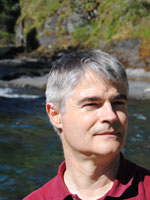
Peregrine Falcon:
Manhattan
by Daniel MacIsaac
Dan lives and writes in a home overlooking Witty's Lagoon on Vancouver Island.

The broker glares
from a glass crag,
malevolent against
that sheared scarp.
His hooked beak
preens a power tux
as he rattles claws
like slate cufflinks.
Flint eyes fixed
on a down market
of heedless doves,
he catapults
chaos—plummets,
slams talons fisted
to stone against
a bewildered bird,
and on the crazed
upswing, seizes
shocked flesh burst
from the blast,
the quickest
cut-throat
in that break-
neck business.
© Daniel MacIsaac
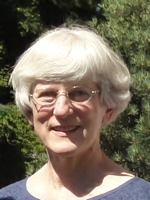
Axis Mundi, Tree at the Center of the Universe
by Muriel Nelson
Muriel lives in Federal Way, Washington, near Puget Sound and West Hylebos Wetlands Park, one of Puget Sound’s last remaining peat bogs.

My writing lamp blinks off whenever it pleases.
Stay with me, little light.
Outside in winter coats, firs stand around.
They lean close to whisper windy chants
and show with apparent parental patience
why Native Americans call them grandfathers.
If such a tree falls in a forest
while other trees bend in the icy wind
and no one is there to hear —
or if only one hand claps (that other
Zen riddle, like a one-penny tip
from a hostile patron) —
if we live a long time with these koans
as trees rustle old limbs, drop things, make cracks, push back,
nurture each other, and generally get on with it —
if we don’t hear when a person or tree hurts and falls —
if whole forests clap with biblical zeal, and we don’t take a stance
even now when earth’s central tree’s wobbling as never before —
how will we keep our balance?
© Muriel Nelson
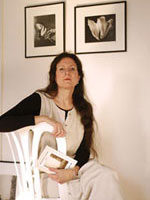
Arctic North
by Therese Halscheid
Therese was raised near a prehistoric pond where the first dinosaur bones were unearthed in North America.

We went where the wind insisted across the frozen river
to reach an abandoned fish camp, a desolate place.
The hat I wore was of wolverine fur — it was like that
in the arctic — for the tribe I stayed with used every part
of what they caught, and the animal was blessed for everything
it offered, and what it gave of itself went well beyond food.
Up river, twenty-some miles, we parked the snowmobile
to climb an embankment but our boots sank suddenly
we were thigh-deep in snow. Couldn’t lift out. Needed to
grab hold of something, though there was nothing to cling to
only firm gusts of wind and a fistful of flakes.
Our hands went down to balance our weight, to lift
our boots from the depths of the windblown drifts,
hoping the snow would hold as we crawled like wild animals,
Kim and I, like a wolverine might have,
had one been there. There were imprints in snow
that Kim said were lynx tracks. When she mentioned
they were fresh, a fear came coursing through. Still,
we inched along while the snow held us, it held as we scaled
to the spot where some cabins were. And where the racks were
for smoking salmon in summer, and a frozen field was,
and behind the field a forest of enduring spruce.
Their boughs were weighted by snow
but beyond that nothing could be discovered.
The lynx that came had gone.
Seemed the land wanted nothing upon it but winter.
It could ward off anything by what it wore.
“Arctic North” appeared in SWWIM
© Therese Halscheid

The Telling Wind
Wales, Alaska
by Therese Halscheid
Therese was raised near a prehistoric pond where the first dinosaur bones were unearthed in North America.

If, in this moment I speak with a voice
it is to say of the ground, it is not fit for trees
nothing grows here but snow
the ice fog moves with nothing to cling to
if I am to speak of the land’s lonely beauty
it is to say of both winter and summer, the color is white
it is to tell of the natural spring
set against the flank of a mountain
and how the people all come to it
going in sleighs with raw air freezing their lungs
of the salty sea, the vast Bering Sea,
to mention that even it freezes
which is to say where walrus are lounging on icebergs
and how, in late spring, the waves house the whale
and of the sky, a sky so shockingly cold, it is to add how
the moon appears with an open mouth.
If, as air, I speak --
if what I speak of is enough
to brush back the thin dry snow
it is to show you the graves of the dead
it is to say of the dead that
all the winters in them, their bodies remember.
“The Telling Wind” first appeared in Imagination & Place: Weather, and in the author’s book Frozen Latitudes (Press 53)
© Therese Halscheid

Land of No Time
the northern interior, Alaska
by Therese Halscheid
Therese was raised near a prehistoric pond where the first dinosaur bones were unearthed in North America.
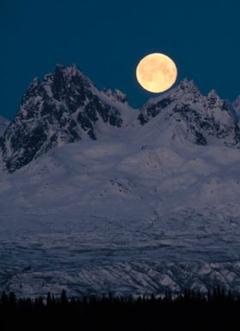
In a place of always light or always dark, in the arctic north,
there are no required hours, no hurry for the future
and little thought of the past
the present is one continuing moment --
the body moves to natural rhythms, is fluid with seasons,
living the way a river does
how it carries what comes to it
returns to land, what it was tossed
or think of it this way, choosing when to wake, when to sleep
think of the summer when the sun is constant
all during the summer, when day ends
the light does not
and it is like that
living without the clock
you cannot schedule this part of the earth
there is no passage of time, only change
in the coming and going of moon, in the wind that blows freely
from the cold outer edge
of the world.
“Land of No Time” appeared in US1 Worksheets and in the author’s book Frozen Latitudes (Press 53)
© Therese Halscheid
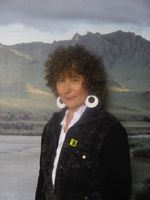
All That Glitters Is Not
by Ellaraine Lockie
Ellaraine grew up in a small Northern Montana farm town by the Missouri River. She lives mostly in Northern California but spends part of each year in the Montana prairie cabin mentioned in her poem on land that used to be her family’s homestead.

Sun like oil slick on water
polishes icicles that hang
from the eave above the cabin window
Where there were none this morning
An act by the divine creator of art
And perhaps compensation
for last night's view of November rage
As though the devil ripped
my grandmother's handiwork from the table
And flung it in miniscule motifs
over and over against the glass
His hellhole howl as chilling
as a cat in an all-night heat
Stillness now except for prism light
dancing carnival colors across
the oak plank floor in front of the window
I'd believe that God won this round
in the ongoing battle of forces
If I didn't remember a mittened hand
holding an icicle
The danger sign parents flashed
when 20 below turns icicles adhesive
The dagger point that might have served
as omen if I hadn't been seven
With eyes that saw rhinestones
and with a mouth parched
by memory's want of a popsicle
I wouldn’t have paid with skin and blood
Pain traded for forbidden pleasure
The curse cast by Eve
as sweet juice ran down her chin
Previously published in Hot Metal Press
© Ellaraine Lockie
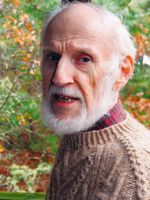
Check-out
by Brendan Galvin
Brendan lives out on the end of Cape Cod on the Atlantic Flyway.

He runs one pale hand along the sack
of sunflower seeds and asks,
“Why are you buying these
this time of year? What do
you see? Blue jays?” He isn’t
the usual checker I patronize here.
He’s new, or at least I have never
seen him before, but I start in
with my winter list anyway: yellow rump
warblers, five kinds of woodpeckers,
namely downies, hairies, red bellies,
flickers and yellow-bellied sapsuckers.
Still stroking the plastic bag, though
I can see he’s drawing a blank
because I am a graybeard
with a white nest under my Orioles cap
and bifocals under that. I won’t ask
how he can live on a flyway and never
notice. “Don’t blue jays have to eat
in January? What about tufted
titmice?” His eyebrows flick
involuntarily at that because I must be
some kind of deviate to say it, so I add
a rose-breasted nuthatch. “I take it
you don’t live in the forest like I do?”
No reply. I could talk about where
the swans settle overnight near here
before they lift off for the tundra,
or tell him what lives on
the Noup of Noss, or even what
“Noss” means. Even where it is.
“Swainson’s warbler?” I ask the clerk,
though I know it’s way too early and here
they’re very rare.
Blackburnians?”
I could unload a multitude of “obscene”
English bird names on him, but he
rings me out in a hurry, maybe afraid I’ll
ask his name. Haven’t seen him since.
© Brendan Galvin

One Unseasonable
by Jonathan B. Aibel
Jonathan lives in the former lands of glaciers, the watershed of the Assabet River, shortly before it joins the Sudbury to create the Concord River which flows north into the wilds of New Hampshire.

warm
day, my city melts;
every drain pipe
a dance beat,
gutters become streams,
from sunshine atop
an immaculate seagull
cries his victory
before the bricks slide
and blue glass curtains
shimmer and drip,
reflected in the choppy
harbor. Subways fill
from the tracks: mice
escape in coracles
by the thousands, people
caught in winter quicksand
tell the story
of their lives
chasing love and money
in the frozen city.
© Jonathan B. Aibel

All Good Frogs Should be Asleep
by Jonathan B. Aibel
Jonathan lives in the former lands of glaciers, the watershed of the Assabet River, shortly before it joins the Sudbury to create the Concord River which flows north into the wilds of New Hampshire.

Snow yesterday, a real nor'easter
calf-high, heavy and wet.
And Warner's Pond all ice
thick enough to walk on.
Lucien, listen! A single frog calls,
lonely when he should be dreaming
In the chilly mud, as we once wished
you would be, a baby tucked into sleep
after three stories with George the Frog
the last. We made George a winter insomniac
so we could have bedtime stories
in Decembers long past, do you remember?
Once there was a frog named George,
who was twenty-two and one half years old,
which you might think is rather old for a frog,
but George came from a long-lived species of frog
and so it wasn't very old for him. George grew up
in the Assabet river and his best friend in the world
was a medium-sized boy named Lucien, who lived
near, but not in, the Assabet River.
So we began every night, ages ago for you,
for me, yesterday. And today I hear him,
a lone frog in the cold, waiting for his friend,
the boy with a pocket-full of sugar-coated flies.
© Jonathan B. Aibel
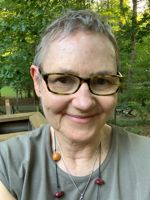
Dormant Season Controlled Burn, Calloway Forest
(after Chuang Tzu)
by Maura High
Maura was born in Wales and now lives in the Piedmont of North Carolina, an area of low hills and uncertain drainage patterns in the same Cape Fear watershed as the Calloway Forest of this poem.

What more can be said about fire:
that it nibbles up the grass stalks,
and rips through the cane and tangle in the seep.
That is how the fire passes on.
All day I thought about nothing
but how much fire
to drop, or water, and how.
How fast to step through the slash, how far,
dipping the torch left or right.
Spot, spike, line, ring.
Whether to get out of the cab
and stamp out the flame sputtering
in the grassy track.
Wiregrass, scrub oak, longleaf
in grass stage, burned down; scorched
pinecones, ash and char.
This is how fire passes on.
Through the layers of soil, the deep roots,
and seed shells cracked open,
into sprout, and shoot, and green.
© Maura High
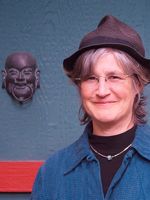
Moorings
by D.R. Goodman
D. R. lives in the Peralta Creek watershed above San Francisco Bay. From her desk she looks out over a coast live oak and a small yard owned by an aggressive male Anna’s hummingbird, but frequented by such winter visitors as Townsend’s warblers, yellow-rumped warblers, and golden-crowned sparrows.

Those things we’re moored to, like the gypsum sands
of Alamogordo, shift within a day
and leave us holding useless maps—the way
still clear in one sense: foot must step, and hands
swing forward toward the present, the demands
of live, and onward. Landmarks slip away
in drifts and dunes; surveyor’s marks decay;
our lots and lines, our walls and massive stands
of trees come down to stump and ash. What’s gone
still trails us like a broken anchor line,
heavy and weightless both, somehow—till one
cold winter, we walk out before first light,
glance up where trees should block the sky, and find
the stars are spinning paths across the night.
This poem was first published in Able Muse Review.
© D.R. Goodman

Habitat and the Most Magnificent Mammals
by Marshall A. Lichtman
Marshall lives on the edge of the Ballona Wetlands in Playa Vista, California.

Reading the article in the New York Times on October 8, 2020, about the sale of one of the most complete Tyrannosaurus rex skeletons, Stan, so designated for the first name of the paleontologist who uncovered its bones and assembled it, I thought about the threat to our current giant creatures. The sale of this most complete T. rex to an anonymous buyer, thought to be in the Middle East, for 31.8 million dollars is, unless it is gifted to a museum, a testimony to the triumph of hubris (the buyer) and greed (Christie’s and its client) over public good.
Apparently, the fossil market has become attractive to private buyers, risking pricing museums out of the bidding. One can only hope the rising temperatures of the earth treat our species more kindly than the Cretaceous-Tertiary Extinction event of approximately 66 million years ago treated all the many non-avian species of dinosaurs. (Avian dinosaurs, or birds, are not extinct, obviously.) The non-avian dinosaurs had a good run, approximately 125 million years. The Extinction was apocalyptic; the current, global warming, is death by a thousand cuts, including tropical cyclones, hurricanes (typhoons), tsunamis, floods, tornadoes, droughts, wild fires, loss of coastal communities, loss of critical habitat (e.g. Amazon and Arctic) and more.
Returning to the largest mammals, the hierarchy starts with (i) the blue whale (up to 150 tons and 100 feet long), the largest animal ever to roam the earth or seas, made possible by the buoyancy provided a sea creature. Next in weight sequence is (ii) the African elephant (up to 7 tons). It is followed by (iii) the killer whale (orca), a species of dolphin (up to 6 tons). Next in size is (iv) a pinniped or fin-footed mammal (e.g. walrus, fur seals), the southern elephant seal, the largest terrestrial meat(fish)-eating mammal (up to 4.5 tons), outweighing lions, tigers and bears. Pinnipeds live in the ocean but spend extended periods of time on land. The next in weight is (v) an even-toed ungulate (e.g. deer, cow, pig), the hippopotamus (up to 4.5 tons), followed by (vi) an odd-toed ungulate (e.g. horse, zebra), the white rhinoceros (up to 2.5 tons). Those are the top six mammals in size based on weight. (The giraffe is the largest even-toed ungulate if one considers only height).
I would like to consider the seventh largest mammals in more detail, the polar bear, in part because it is the one that is part of the North American ecosystem (Alaska and Canada). The loss of the Arctic ice cap is proceeding unabated. As we try to grapple with greenhouse gases CO2 and methane, generated from first world countries, nitrous oxide (N2O) is being generated in vast amounts in Africa, Asia, and South America as those continents try to feed their population growth by increasing the use of nitrogenous fertilizers.
The sea ice in the Arctic is critical habitat for polar bears because they hunt seals from a perch on ice, awaiting the appearance of a seal seeking air in the cracks between ice sheets. Polar bears, despite long intervals of sedentary behavior each day, require an enormous 12,325 calories per day in their diets. They depend exclusively on seals for their sustenance. They “still hunt,” perched for hours on ice, and when a seal surfaces they rise on their hind legs and whack the seal with both front paws and, once it is stunned, grasp it by the neck in their teeth and bring it onto the ice to feed. Some sustenance can come from a rare whale carcass, but seal hunting is their principal food source. Polar bears, also, make their dens on ice covered by deep snow banks, where they hibernate and deliver their cubs, who are usually tied to their mothers for approximately two years before becoming independent. The male polar bear is of no help and can even be a threat.
The Arctic has warmed twice as fast as the rest of the world, resulting in a sea ice decline of 13 percent each decade since 1980. Ice forms later in the fall and breaks apart earlier in the spring, resulting in sea ice cover declining in thickness and extent. When the jet stream randomly sends warm southerly winds north, it keeps thinned sea ice from freezing. These enormous gaps in ice require bears to swim long distances to find ice on which to perch for seal hunting. Moreover, the large gaps make the appearance of seals within reach much less frequent.
The denial of climate change, global warming and its consequences and its inevitability, is akin to the claims of the flat earth society, a group that has had trouble garnering members with images of earth from space (although the die-hards argue it is the distortion of the lenses used that gives the earth a spherical appearance!) When Mar-a-Largo is in the Atlantic, there may be acceptance, but we cannot wait that long. The refusal of a Supreme Court Justice candidate to agree that the ongoing global warming calamity exists is frightening testimony to the suppression of fact to meet selfish goals.
The Trump administration is opening up the Arctic National Wildlife Preserve to oil and gas exploration. This 20 million acre reserve is home to polar, grizzly and black bears, moose, caribou, tundra Dall sheep, muskoxen, wolves, eagles, lynx, wolverines, martens, red foxes, polar foxes, river otters, porcupines, muskrats, minks, and beavers, and it is habitat for many migratory birds. The marine ecosystem is as significant as the terrestrial one and it is threatened.
The Preserve was established by President Theodore Roosevelt in 1903 and carefully protected by every administration since the arrival of the current one. Now, oil and gas exploration is being proposed with oil leases to follow. A double whammy is at hand: a severe threat to this magnificent wilderness and more fossil fuels to advance global warming.
Thus, unlike the singular event that annihilated all species of non-avian dinosaurs, the extraordinary, magnificent large mammals that roam the African, Asian, South and North American continents are severely threatened by climate change, loss of habitat, and poachers and without a dramatic change in attitude and programs they will gradually be eliminated from the earth’s ecosystems.
© Marshall A. Lichtman
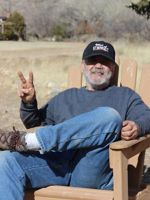
Mending Mittens
by Larry Schug
Larry lives in the Mississippi River-Sartell watershed alongside a "forever" conservation easement which includes part of a large tamarack bog, also preserved. Other inhabitants include white-tail deer, wild turkeys, beaver, otters, muskrats, sandhill cranes, great blue and green herons, turtles, tree frogs and many species of songbirds.
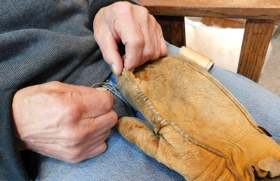
Mending my leather mittens
for the third time this winter,
I sew them with waxed string
made to repair fishing nets,
hoping they’ll last
until the splitting maul rests
against the shrunken woodpile
and the hoe and spade come out of the shed.
I find myself praying.
Blessed be those who have laced together
the splits at the seams of this world,
repair its threads of twisted waters.
Blessed be those who stitch together
the animals and the land,
repair the rends in the fabric
of wolf and forest,
of whale and ocean,
of condor and sky.
Blessed be those who are forever fixing
the tear between people and the rest of life.
May we all have enough thread,
may our needles be sharp,
may our fingers not throb or go numb.
May each of us find an apprentice,
someone who will take the needle from our hands,
continue all the mending that needs to be done.
Previously published in Your Daily Poem.
© Larry Schug
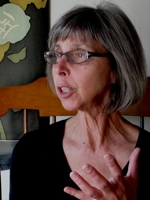
At the Window After a Great Snowfall Waiting for You to Come Home
by Laura Budofsky Wisniewski
Laura lives in the central Lake Champlain Valley, in the Lewis Creek Watershed, a lovely little tributary of which runs through her land. The plants and wildlife of Lewis Creek are currently being threatened by a drastic rise in housing and commercial development.

Sometimes at dusk,
the past stirs in my body
like a sleeping child.
Remember that meteor shower,
how the lips of the darkness opened
and rogue stars streaked white confessions
into the ear of our years?
Even before the wide white of your high beams,
I hear your studded tires crackle on the ice.
Previously published in the author’s chapbook, How to Prepare Bear.
© Laura Budofsky Wisniewski
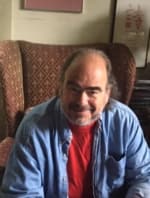
Winter Dusk
by Jonathan Blake
Jonathan makes his home in central Massachusetts along the Quaboag River.

The light going
Is a sadness
He lingers
In it close
To a small fire
Listens for
The downshifting
Gears of the mail truck
Rises to walk
The stony road
Black against dusty black
The bare maples that line
The road are a dark language
Of starlings beginning to still
When he returns
He lights the lamps,
Turns the radio softly
On, happens upon
Rubenstein’s piano --
Chopin’s
Nocturnes
He opens the letter
He imagined
Might arrive
Begins to believe
We can be forgiven
© Jonathan Blake

Ragged Angels
by Jonathan Blake
Jonathan makes his home in central Massachusetts along the Quaboag River.

Imagine the brightness of the winter
Light suddenly muted white-grey
The color of emptiness, the color
Of growing old. How some stand
In the face of a biting wind.
The men circle the barrel
Of flames in back of the feed store,
Shift the weight of their talk
From one weary leg to the next:
Some blow into their chapped hands;
Some cough blood into the blue
Cotton of kerchiefs; some tighten
The screw caps of small bottles
They slip into the frayed pockets
Of their heavy coats.
This is the America we have
Forgotten: Ragged angels of the land,
They wonder why they
Have been forsaken, heads bowed
To the wild dance of the flames
As night begins to darken the miles,
And the stars, the stars no longer
Burning like hope.
© Jonathan Blake
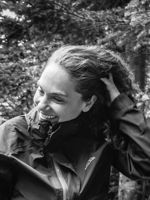
Mount Liberty in March
by Sahra Kuper
Sahra lives near Stony Brook, a subterranean tributary stream in Boston, Massachusetts, that begins at Turtle Pond, winds its way under city streets, through neighborhoods, along a railroad line and empties into the Charles River Basin.

March teeters on the edge of
winter’s memory as I put one
snowshoe in front of the other
and remember what she said—
the sun is still there
even when I can’t feel it
or can’t see, for that matter,
two feet in front of my face
the future is like that
packaged up in the clouds.
I pull my thoughts away
from the magnet in my brain—
to see a gray jay dart,
chasing the light between branches
and the way the moss-beards
make old men out of trees,
familiar whispers
of dried beech leaves
keep me company now
as the late afternoon sun
breaks through,
spilling into my path
and relighting the pilot of my heart.
© Sahra Kuper